|
|
|
|
The Supreme Court term finally closed today, with a long-awaited ruling from the justices that will likely echo down the decades through American politics and law. In Trump v. United States, the
conservative majority determined that the U.S. president has broad immunity for acts taken in the official role of president. The decision has the effect of narrowing the basis on which special counsel Jack Smith can prosecute former President Donald Trump for actions he allegedly took to overturn the 2020 presidential election. The ultimate effect could be that Trump may never face trial in the case.
There were other consequential Trump-related cases, including one that determined whether he could appear on the presidential ballot in Colorado and other states. The court said he could.
And there was also a ruling that upended decades of administrative law in the U.S., in a fisheries case where the justices “overturned the 40-year-old legal tenet that when a federal statute is silent or ambiguous about a particular regulatory issue, courts should defer to the implementing agency’s reasonable interpretation of the law,” as legal scholar Robin Kundis Craig wrote in a story for us. Prepare for a tsunami of lawsuits challenging agency rules in areas from health care to labor.
There were rulings on other hot-button issues, including the abortion drug mifepristone; a ruling that blocked the Purdue Pharma opioid settlement that paid money to victims; and a ruling that will affect
the lives of those experiencing homelessness across the country.
The Conversation’s editors worked with scholars who specialize in everything from criminal to environmental to administrative law to provide you with research-based analysis on these and many other cases the Supreme Court considered this term. We offer you today a selection of them in this newsletter, along with stories that analyze some larger issues regarding both the thinking of the justices and how scholars of history are increasingly trying to contribute to that thinking.
|

|
Naomi Schalit
Senior Editor, Politics + Democracy
|
|
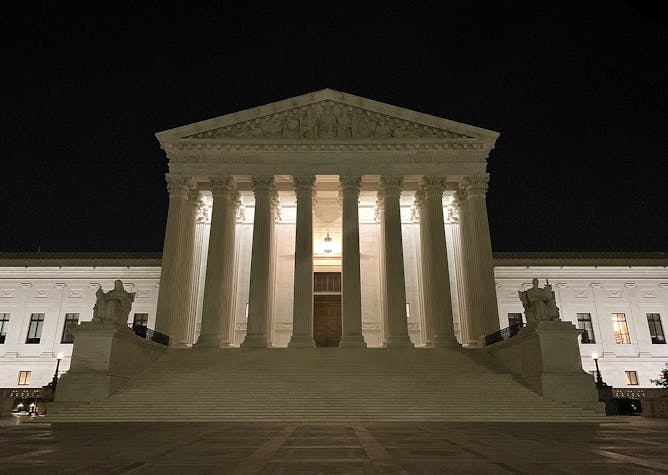
The U.S. Supreme Court in Washington, D.C.
Allison Edge/iStock/Getty Images Plus
Claire B. Wofford, College of Charleston
The Supreme Court’s decision has major implications for the criminal prosecution of Trump and for the country and how it is governed.
|
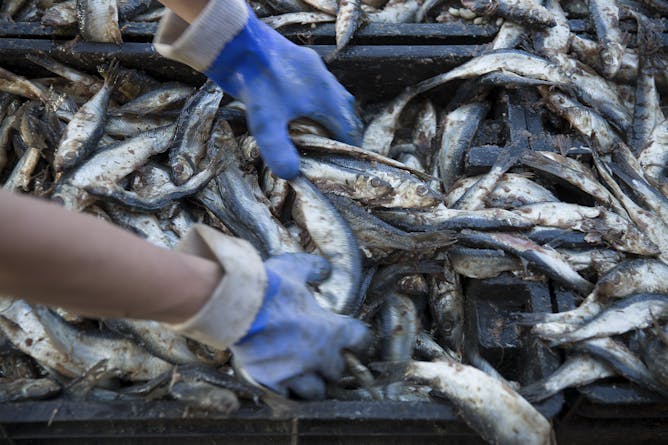
Two fishing companies challenged regulations that required Atlantic herring fishers to pay some costs for observers on their boats.
Joe Raedle/Getty Images
Robin Kundis Craig, University of Kansas
A widely anticipated Supreme Court ruling will sharply limit federal agencies’ power to interpret the laws that they execute and decide how best to carry them out.
|
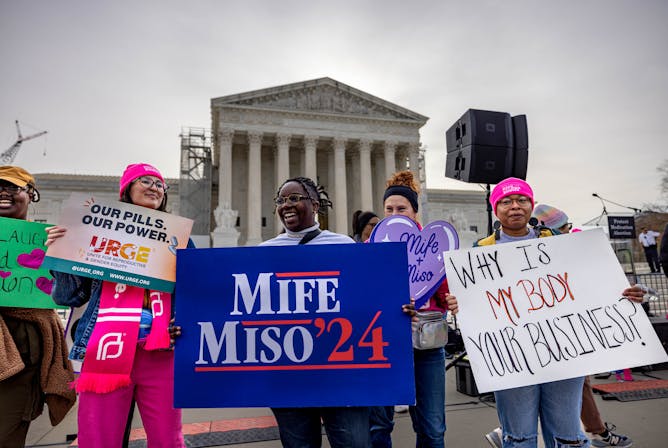
Activists on both sides of the abortion battle are gearing up for it to be a major issue in the 2024 election.
Pacific Press/LightRocket via Getty Images
Naomi Cahn, University of Virginia; Sonia Suter, George Washington University
The opinion did not take on the substance of the plaintiffs’ claims against mifepristone, and the abortion pill is already facing other challenges.
|
|
|
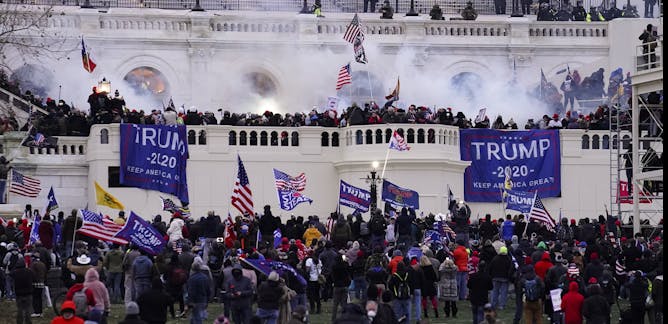
Riley T. Keenan, University of Richmond
Government prosecutors, ruled the Supreme Court, stretched the meaning of a law that’s been used to prosecute those alleged to have participated in the Jan. 6 riot at the US Capitol.
| |
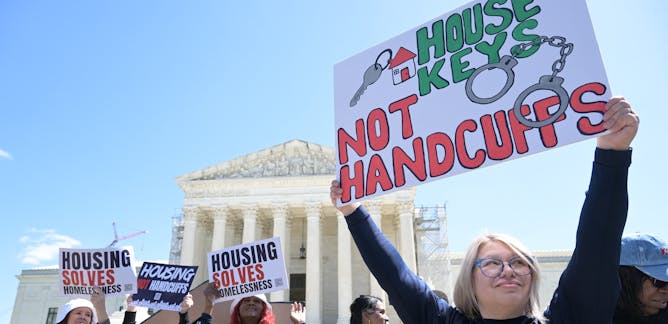
Clare Pastore, University of Southern California
In a major homelessness ruling, the Supreme Court holds that cities and municipalities can punish people for sleeping outside, even when they have nowhere else to go.
|

Lynn Greenky, Syracuse University
Florida and Texas sought to prevent social media companies from deciding which posts can be promoted, demoted or blocked. The Supreme Court said the tech companies can moderate as they please.
| |
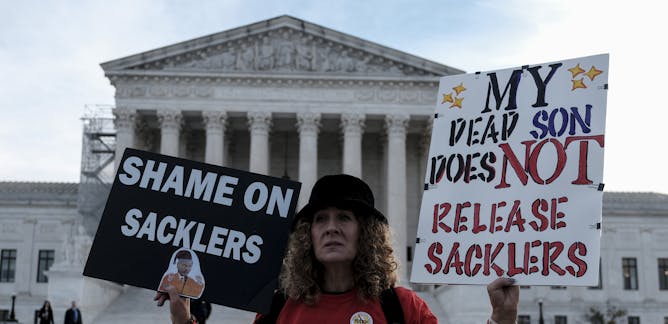
Jonathan Lipson, Temple University
The company helped spur a public health crisis through its deceptive marketing and aggressive sales of prescription opioids.
|
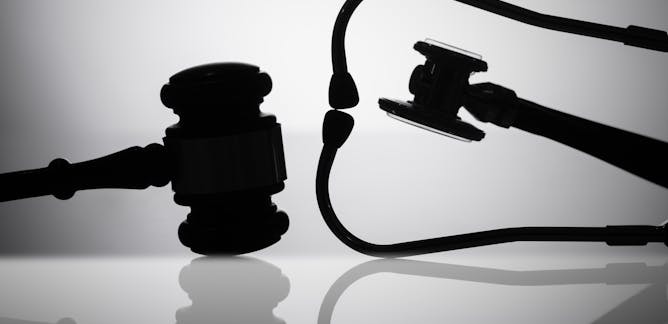
Naomi Cahn, University of Virginia; Sonia Suter, George Washington University
The Supreme Court conceded that it should not have taken up the case to begin with.
| |
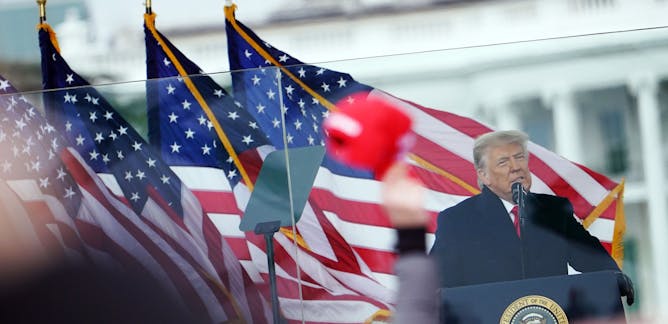
Jeff Inglis, The Conversation; Naomi Schalit, The Conversation; Amy Lieberman, The Conversation
The dissenting judges argued that the Supreme Court’s decision will dramatically expand the president’s powers while in office.
|
|
|
|
|
-
Matthew Hall, University of Notre Dame; Joseph Daniel Ura, Clemson University
What happens if the highest court in the land loses legitimacy?
-
Kevin J. McMahon, Trinity College
The secret recordings of two Supreme Court justices reveal dramatic differences in how they see American political life.
-
Whitley R.P. Kaufman, UMass Lowell
Only 50 years ago, originalism was considered a fringe movement, hardly taken seriously. Now its adherents dominate the Supreme Court.
-
Robert Rosenberger, Georgia Institute of Technology
Anti-camping laws are the centerpiece of the ‘hostile design’ strategies cities use to push the unhoused out of public spaces.
|
|
-
More of The ConversationLike this newsletter? You might be interested in our other weekly emails: Follow us on social media: -
About The ConversationWe're a nonprofit news organization dedicated to helping academic experts share ideas with the public. We can give away our articles thanks to the help of foundations, universities and readers like you.
|
|
| |
| |
| |
| |
|
|
|
|
|
|
|